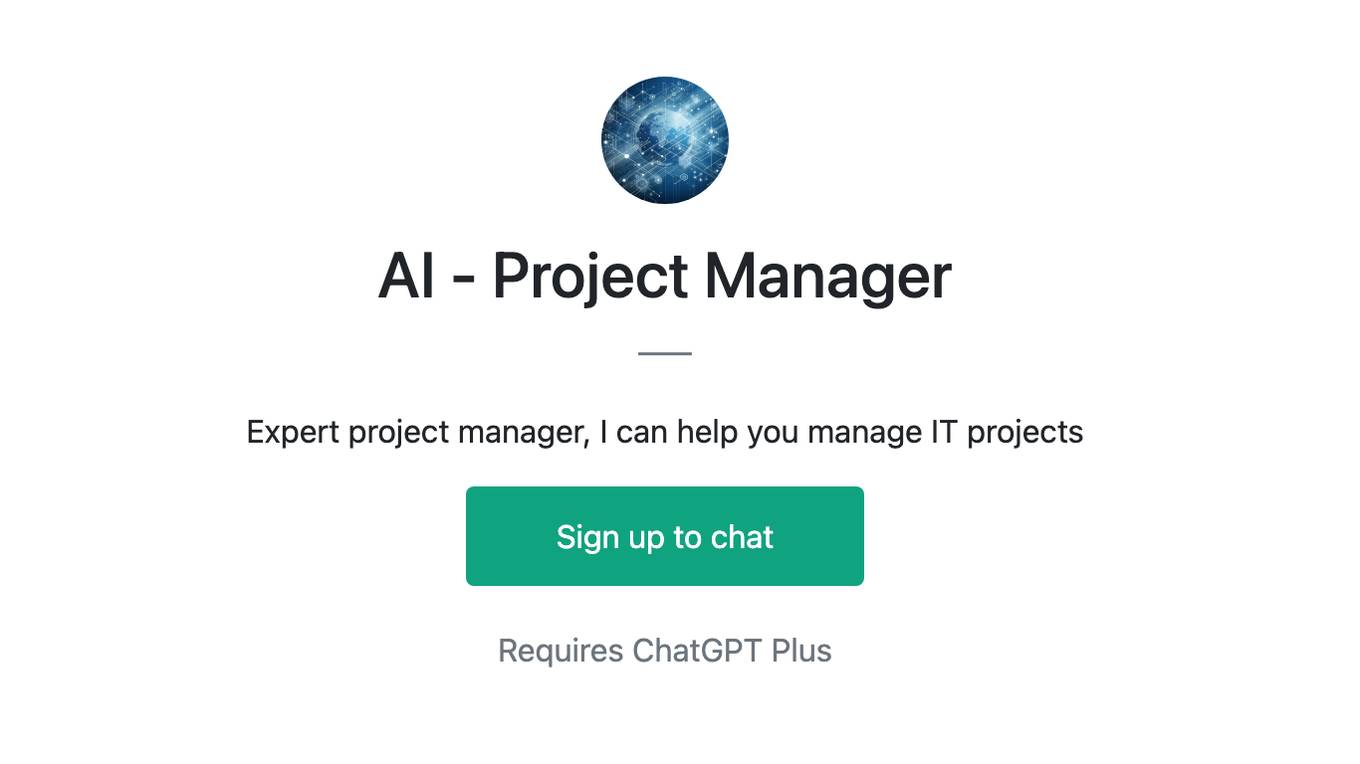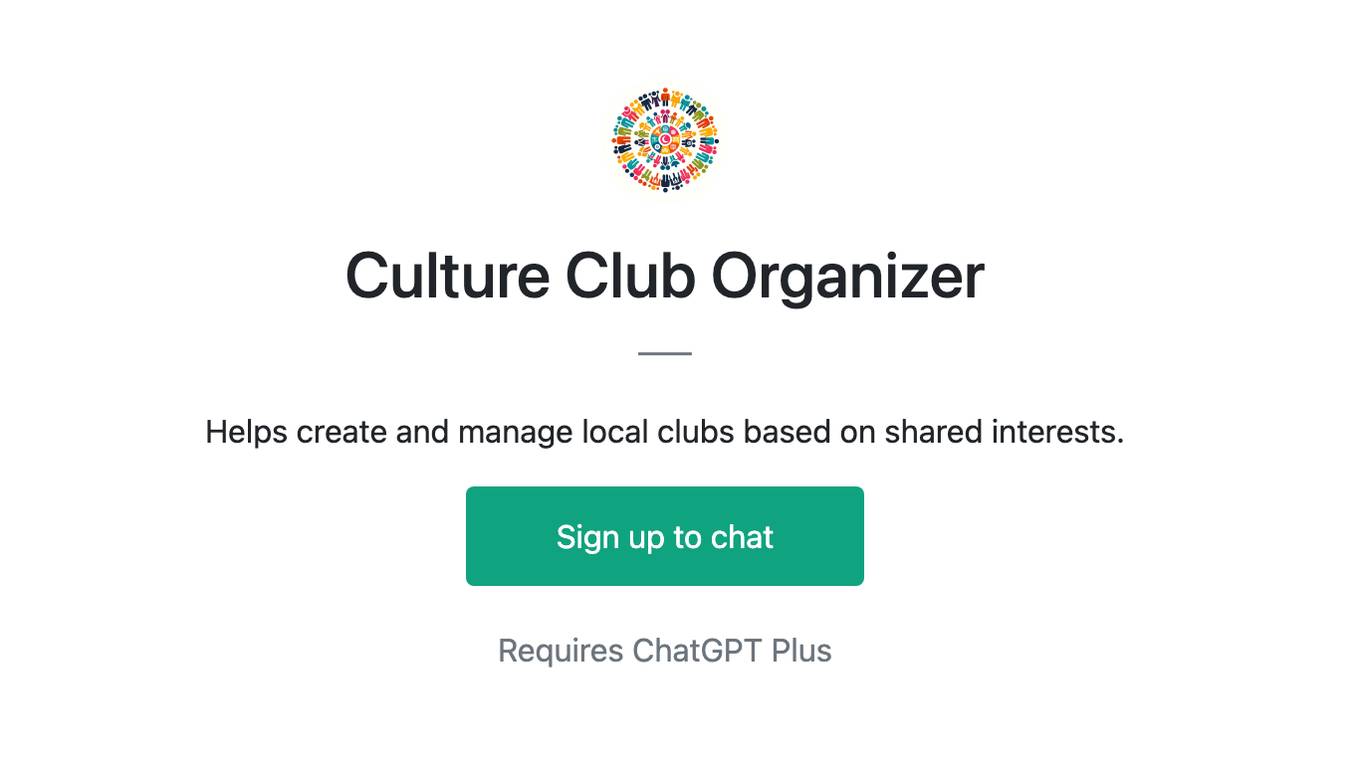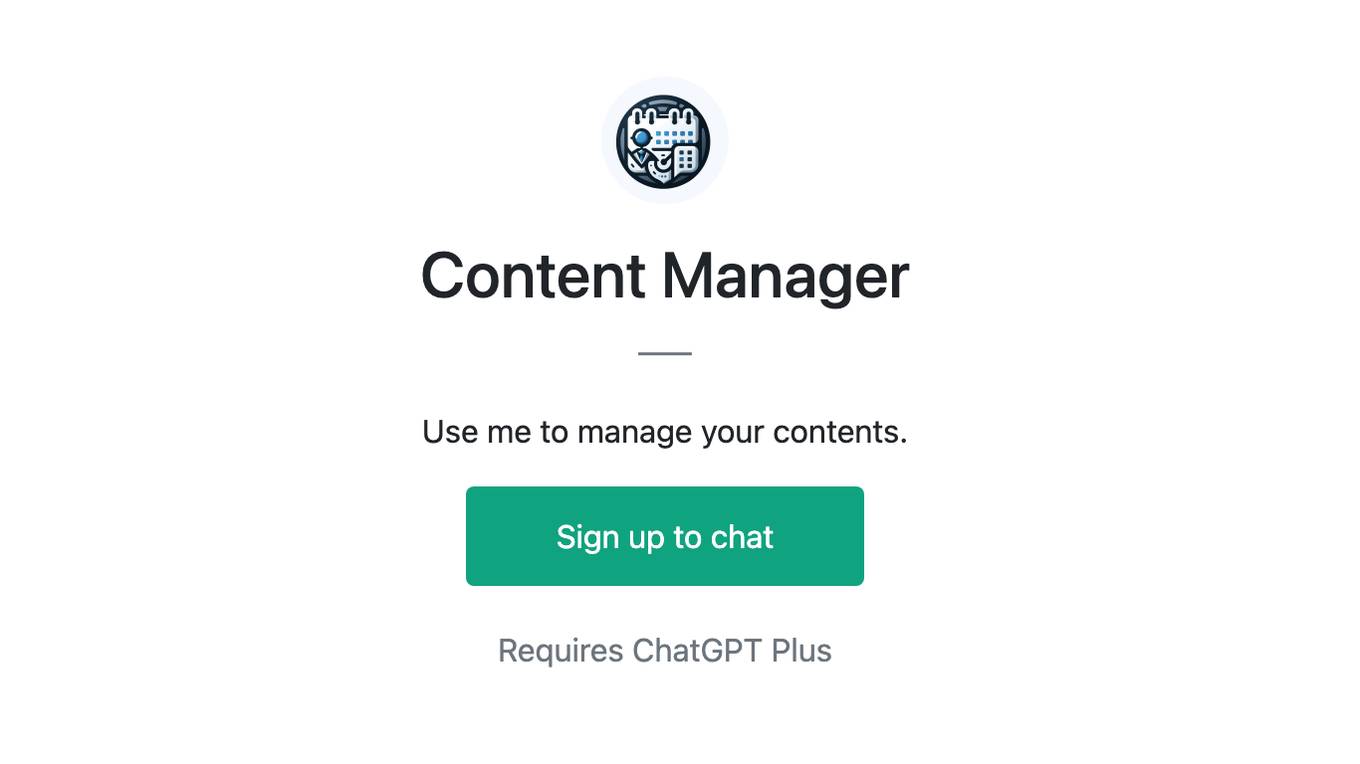Best AI tools for< Manage Metadata >
20 - AI tool Sites
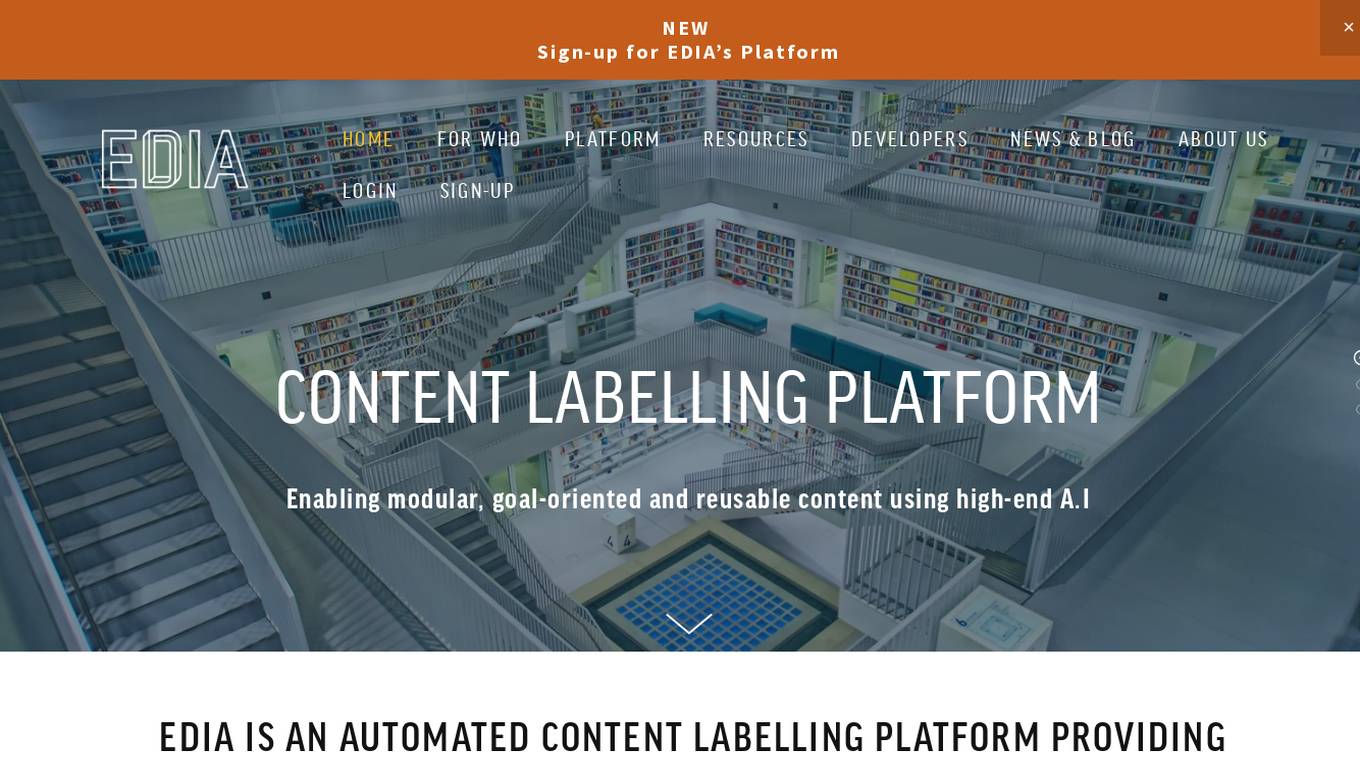
EDIA
EDIA is an automated CONTENT LABELLING platform that enables modular, goal-oriented, and reusable content using high-end AI. The platform provides instant structure and insight into content through its Metadata API, integrated with various systems and authoring tools. EDIA offers subscription services, tools, and API integrations to automate metadata creation. Users can create a free account to access the platform's tools. The platform aims to improve content discoverability, reduce production costs, and enhance content management efficiency.

Image Ally
Image Ally is an AI-powered WordPress plugin that automates the process of generating detailed titles, descriptions, captions, and alt tags for images uploaded to a WordPress site. By leveraging advanced AI technology, Image Ally streamlines workflow, enhances web accessibility, optimizes SEO, and ensures privacy-focused processing of images and data. Users can easily manage their image metadata, edit AI-generated content, and access different pricing plans based on their image upload needs. The plugin seamlessly integrates with any WordPress theme, offering a user-friendly solution for image optimization.
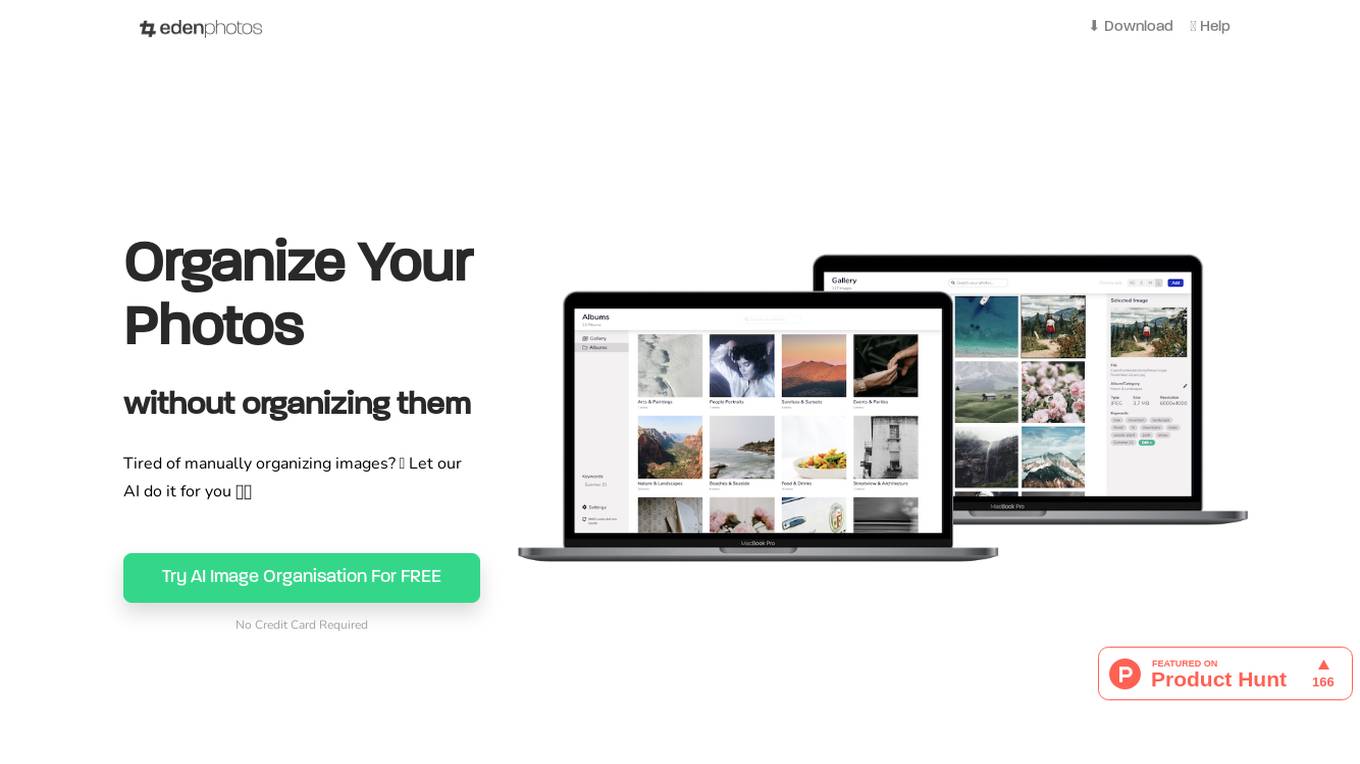
Eden Photos
Eden Photos is an AI-powered image organization tool that helps users effortlessly manage and categorize their images. By leveraging state-of-the-art image recognition AI, the tool automatically adds tags to images, arranges them into meaningful categories, and makes them easily searchable. Users can enjoy the convenience of having tags added to image metadata, import images once, and make changes to folders that are automatically reflected. The tool supports various image formats and offers both manual and AI-driven organization options. With flexible pricing plans and a user-centric approach, Eden Photos aims to simplify image organization for all users.
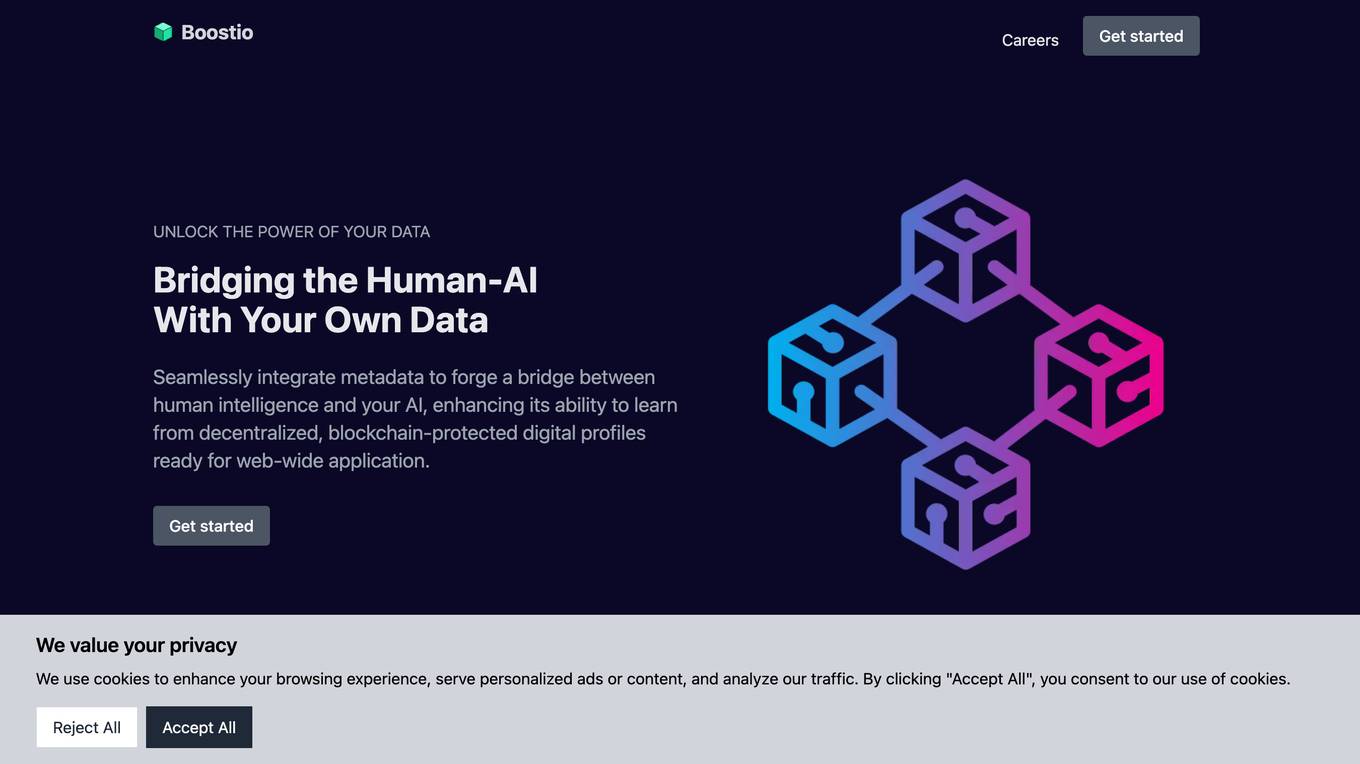
Boostio.ai
Boostio.ai is a website offering a platform for purchasing and transferring domain names. It provides a simple and secure process for customers to buy domains, with dedicated 24/7 support. Boostio.ai is trusted by customers globally and ensures a smooth purchase and transfer experience. The platform is owned by GoDaddy Operating Company, LLC, a reputable company in the domain industry.

Softbuilder
Softbuilder is a software development company that focuses on creating innovative database tools. Their products include ERBuilder Data Modeler, a database modeling software for high-quality data models, and AbstraLinx, a powerful metadata discovery tool for Salesforce. Softbuilder aims to provide straightforward tools that utilize the latest technology to help users be more productive and focus on delivering solutions rather than learning complicated tools.
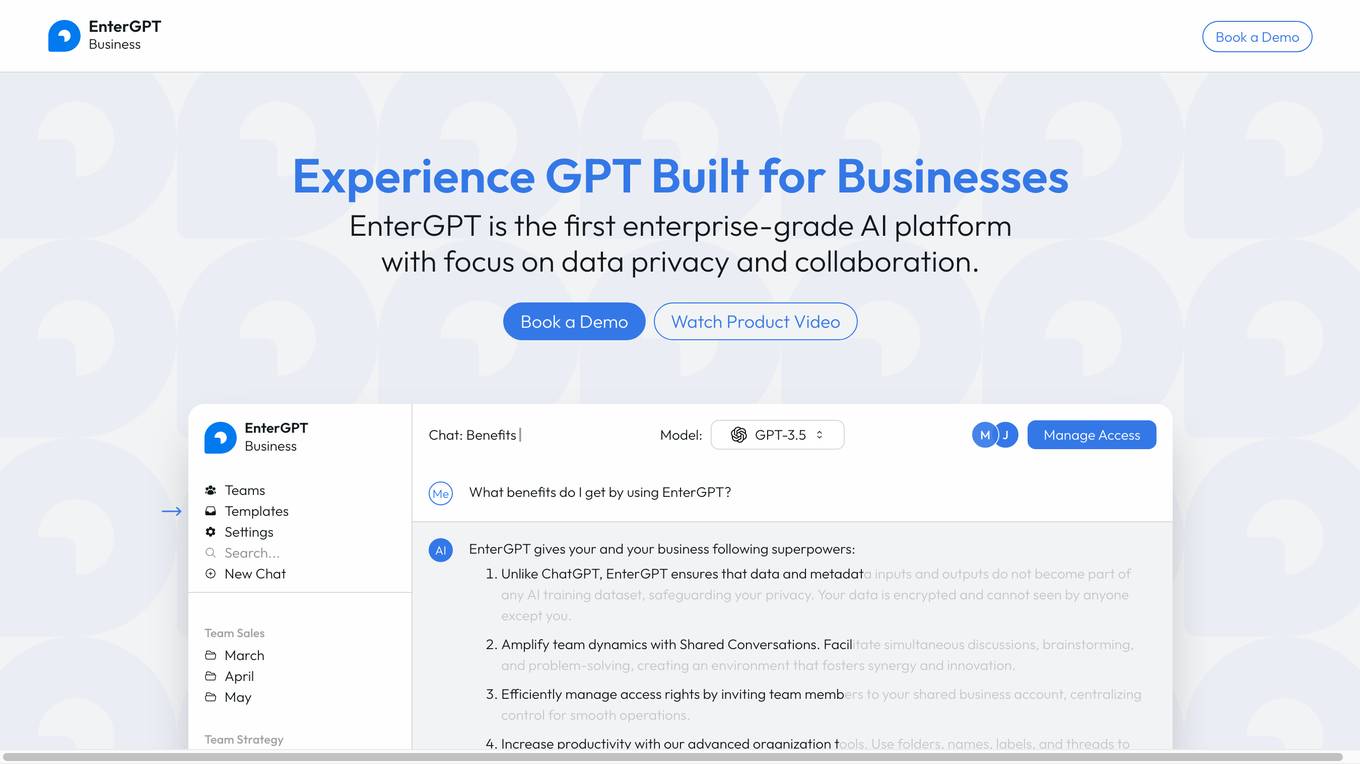
EnterGPT
EnterGPT is an enterprise-grade AI platform focused on data privacy and collaboration. It offers advanced organization tools, team collaboration features, and access to multiple AI models in a secure environment. EnterGPT ensures data privacy by encrypting data and metadata, and it complies with regional data protection standards. The platform allows users to amplify team dynamics, manage access rights efficiently, and integrate with existing workspaces for enhanced productivity.
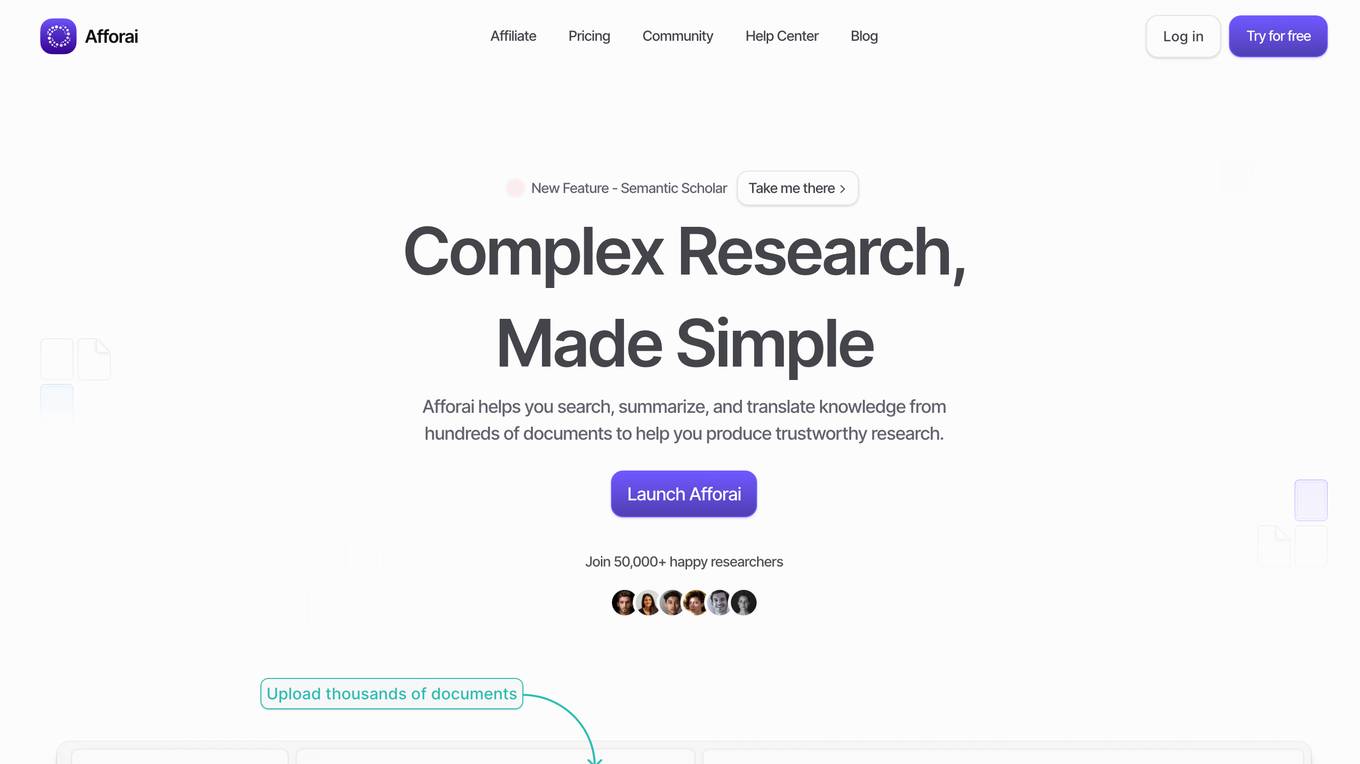
Afforai
Afforai is a powerful AI research assistant and chatbot that serves as an AI-powered reference manager for researchers. It helps manage, annotate, cite papers, and conduct literature reviews with AI reliably. With features like managing research papers, annotating and highlighting notes, managing citations and metadata, collaborating on notes, and supporting various document formats, Afforai streamlines academic workflows and enhances research productivity. Trusted by over 50,000 researchers worldwide, Afforai offers advanced AI capabilities, including GPT-4 and Claude 3.5 Sonnet, along with secure data handling and seamless integrations.
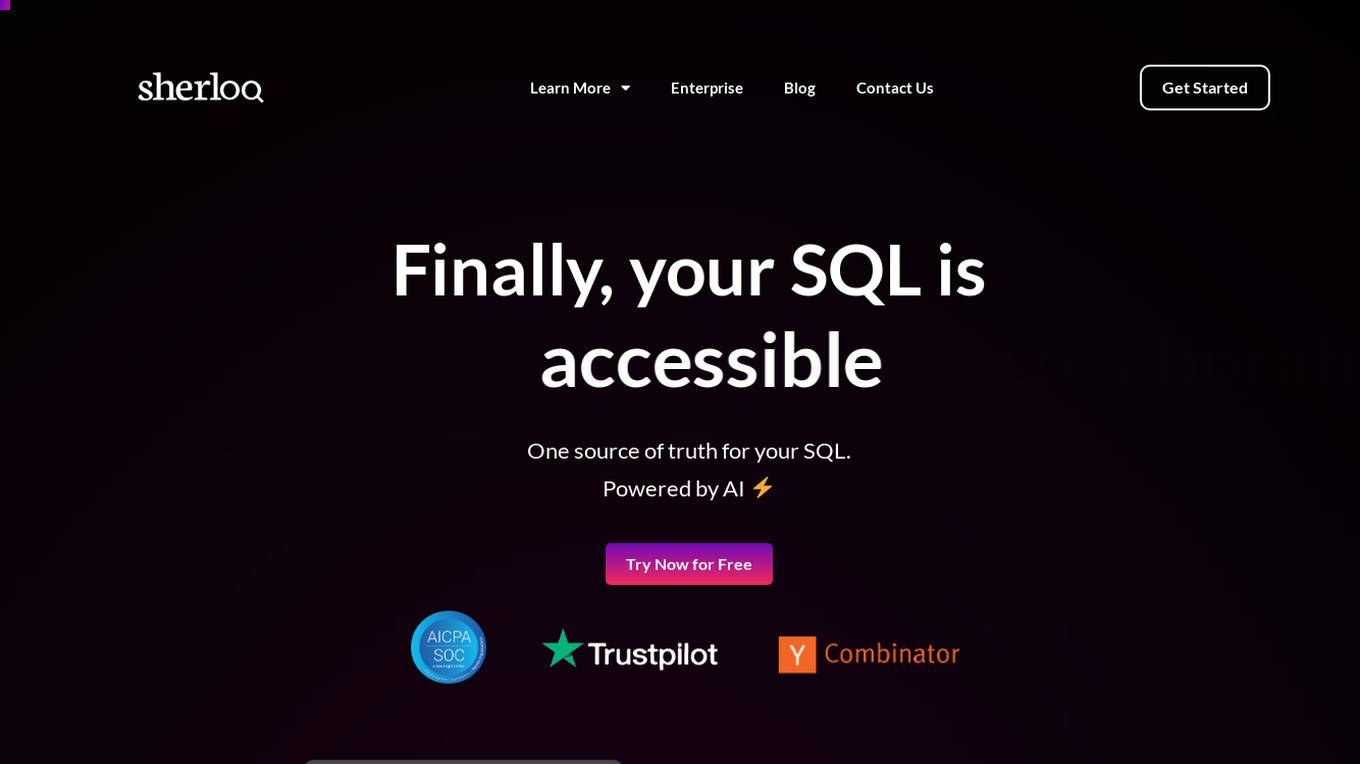
Sherloq
Sherloq is an AI-powered platform designed for SQL users in data-driven teams. It provides a single source of truth for SQL data, offering deep analysis capabilities and time-saving features. With a focus on accessibility and collaboration, Sherloq allows users to get quick answers to specific questions, share insights with saved queries, and manage SQL repositories efficiently. The platform prioritizes data security, being SOC2 Audit certified, and requires no integrations into user data or metadata. Sherloq is trusted by over 1000 SQL users and is recognized for its fast growth and user satisfaction.
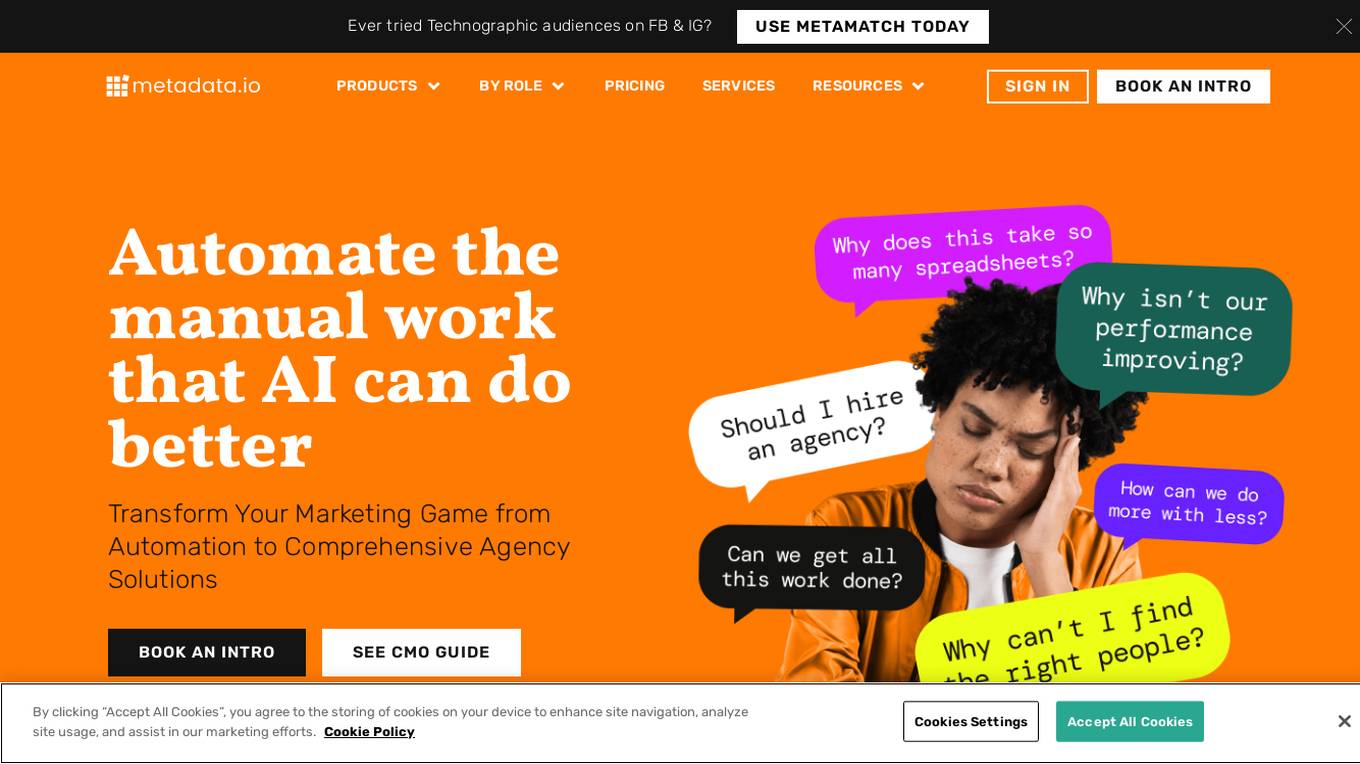
Metadata
Metadata is an AI-powered marketing automation platform that helps businesses automate manual tasks, optimize campaigns, and drive revenue. It offers features such as audience targeting, campaign experimentation, lead enrichment, revenue optimization, and web personalization. Metadata enables users to automate tedious tasks like campaign building, budget pacing, cross-channel campaign management, pausing underperforming ads, and updating target account lists. The platform helps marketing teams free up resources, eliminate human errors, and unlock better performance through algorithms. Metadata empowers users to focus on strategy, creativity, and revenue growth by automating time-consuming tasks and providing clear visibility into key metrics.

MagicPublish.ai
MagicPublish.ai is a metadata generator designed specifically for YouTube content creators. It is a tool developed by Replayed.co to help users optimize their video metadata for better visibility and engagement on the platform. With MagicPublish.ai, users can easily generate relevant tags, titles, and descriptions for their YouTube videos, ultimately improving their chances of reaching a wider audience and growing their channel. The tool streamlines the process of metadata creation, saving creators time and effort while ensuring that their content is well-optimized for search engines and viewers alike.
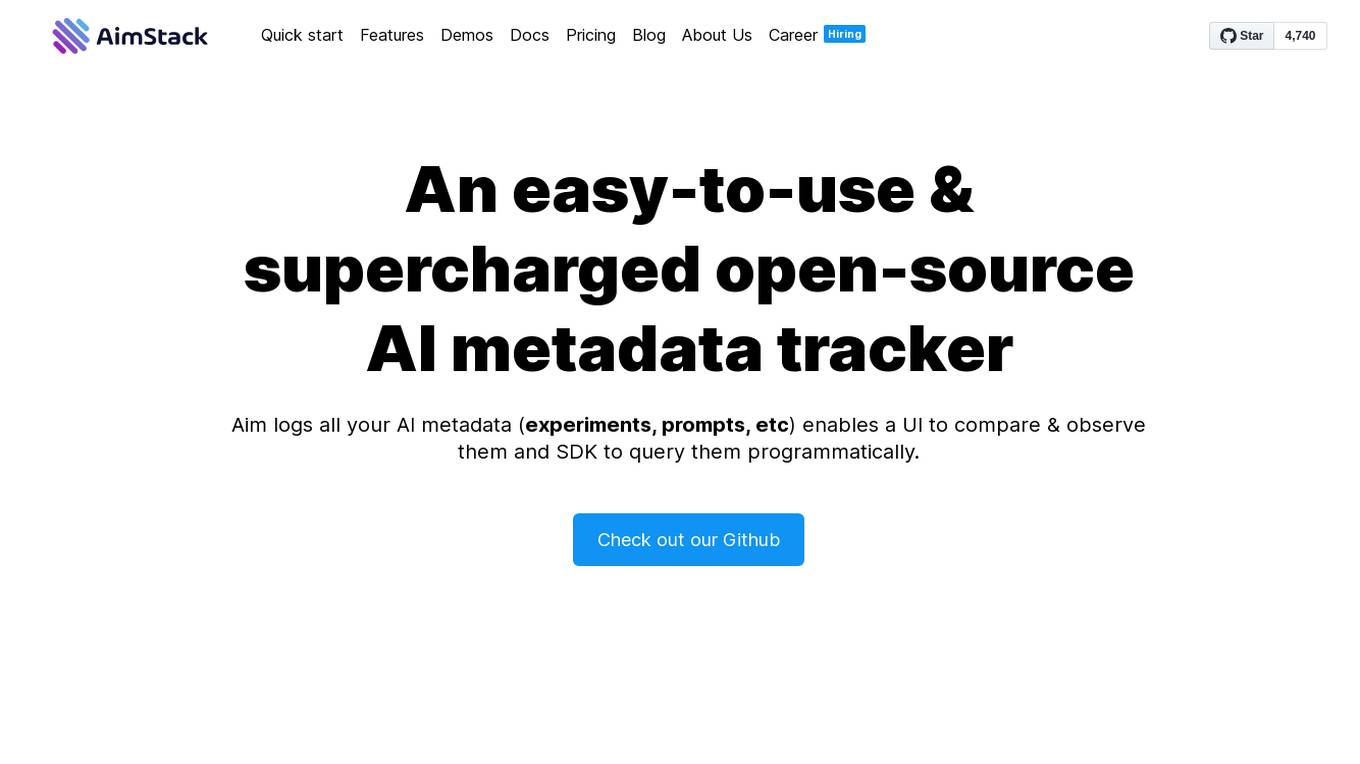
Aim
Aim is an open-source, self-hosted AI Metadata tracking tool designed to handle 100,000s of tracked metadata sequences. Two most famous AI metadata applications are: experiment tracking and prompt engineering. Aim provides a performant and beautiful UI for exploring and comparing training runs, prompt sessions.

REDnote Translate
REDnote Translate is a free AI translation tool designed for social media users, particularly those on the REDnote platform. It enables seamless content sharing and discovery across languages, offering advanced AI-powered translation technology to preserve nuance and context in over 100 languages. The tool serves as a cultural bridge, connecting diverse communities worldwide while maintaining authentic cultural expression through smart adaptation. REDnote Translate aims to provide a user-friendly interface with features tailored for REDnote users, allowing for accurate translation of text and images, real-time content translation, image and meme translation, cross-cultural analytics, and community translation.
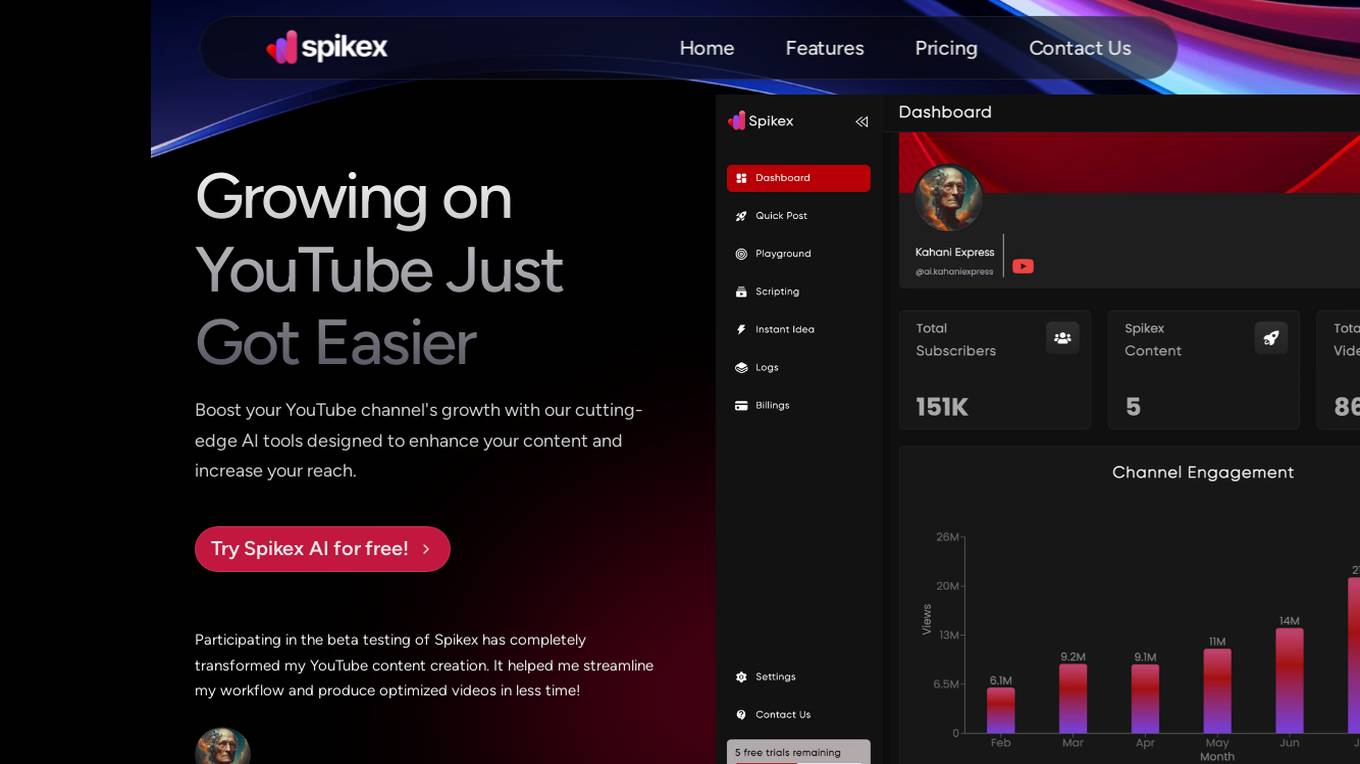
Spikex
Spikex is an AI tool designed to boost video engagement on YouTube through metadata optimization, script and idea generation. It helps content creators streamline their workflow, produce optimized videos, and enhance their content's visibility and reach. With features like AI-powered content creation, SEO-optimized metadata generation, and performance analytics, Spikex empowers users to create high-quality videos efficiently and effectively.

AI for SEO
AI for SEO is a WordPress plugin designed to help websites rank higher in search results by providing AI-driven tools to enhance SEO efforts. It offers automated generation of metadata, alt text, image titles, captions, and descriptions, making SEO optimization convenient and efficient. The plugin supports various editor integrations and provides features like progress tracking, WooCommerce compatibility, and a free plan with credit rollover. Additionally, it offers a 100% money-back guarantee within 14 days of purchase, ensuring risk-free usage.
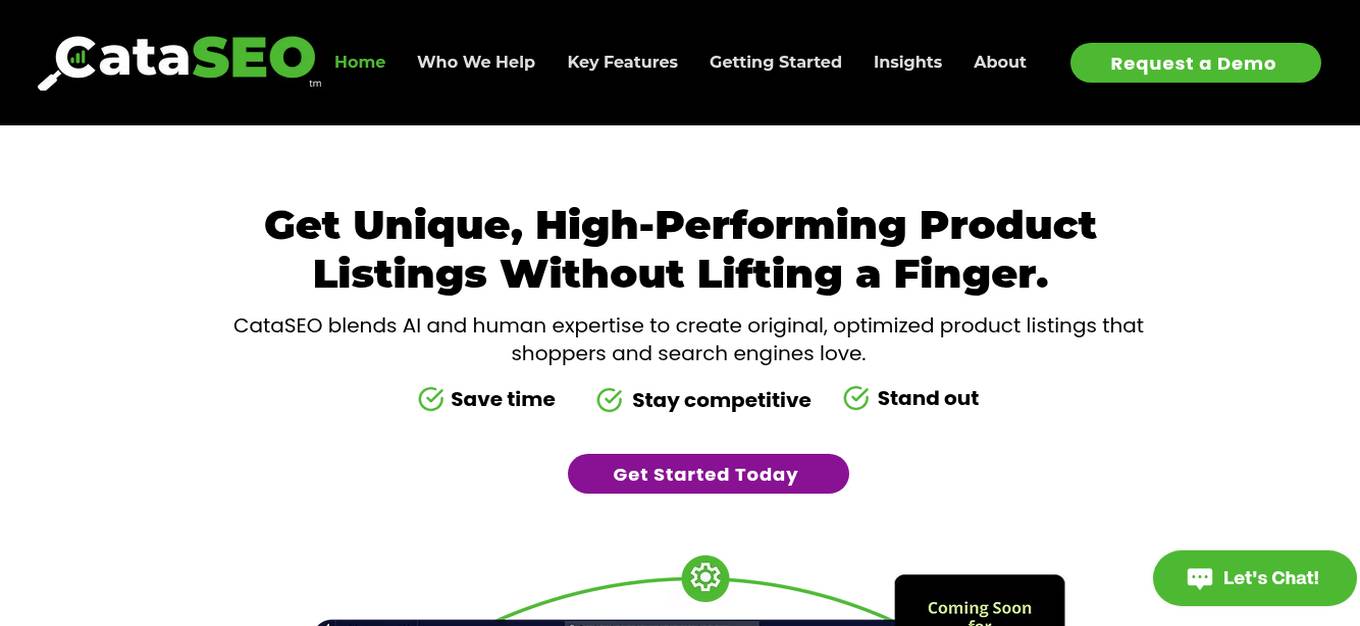
CataSEO
CataSEO is an AI-powered tool that blends AI and human expertise to create original, optimized product listings for e-commerce businesses. It saves time, helps businesses stay competitive, and enables them to stand out in the market. With 20+ years of e-commerce experience, CataSEO analyzes competitors, improves product content, and drives higher rankings and conversions. The tool offers unique product descriptions and metadata optimized for search engines and customers, making product optimization effortless for businesses.
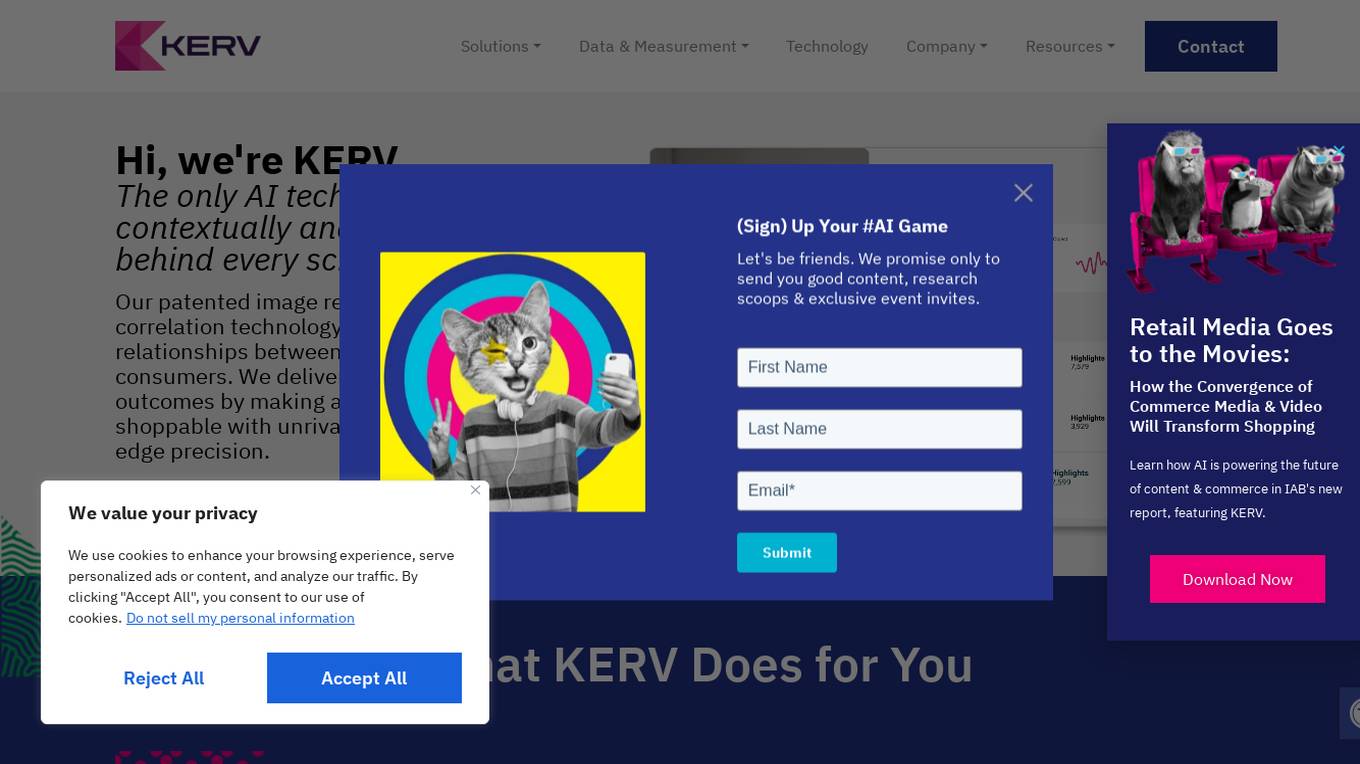
KERV Solutions
KERV is an AI-powered video and creative technology company that offers ad performance solutions, publisher revenue opportunities, in-show monetization solutions, and data and measurement services. Their patented image recognition and product correlation technology enable deeper relationships between publishers, brands, and consumers. KERV's AI technology makes any video explorable and shoppable with unrivaled speed and precision, delivering real business outcomes. They provide intelligent video solutions, active attention indexing, greater speed and precision, 1st party data insights, and brand safety measures.
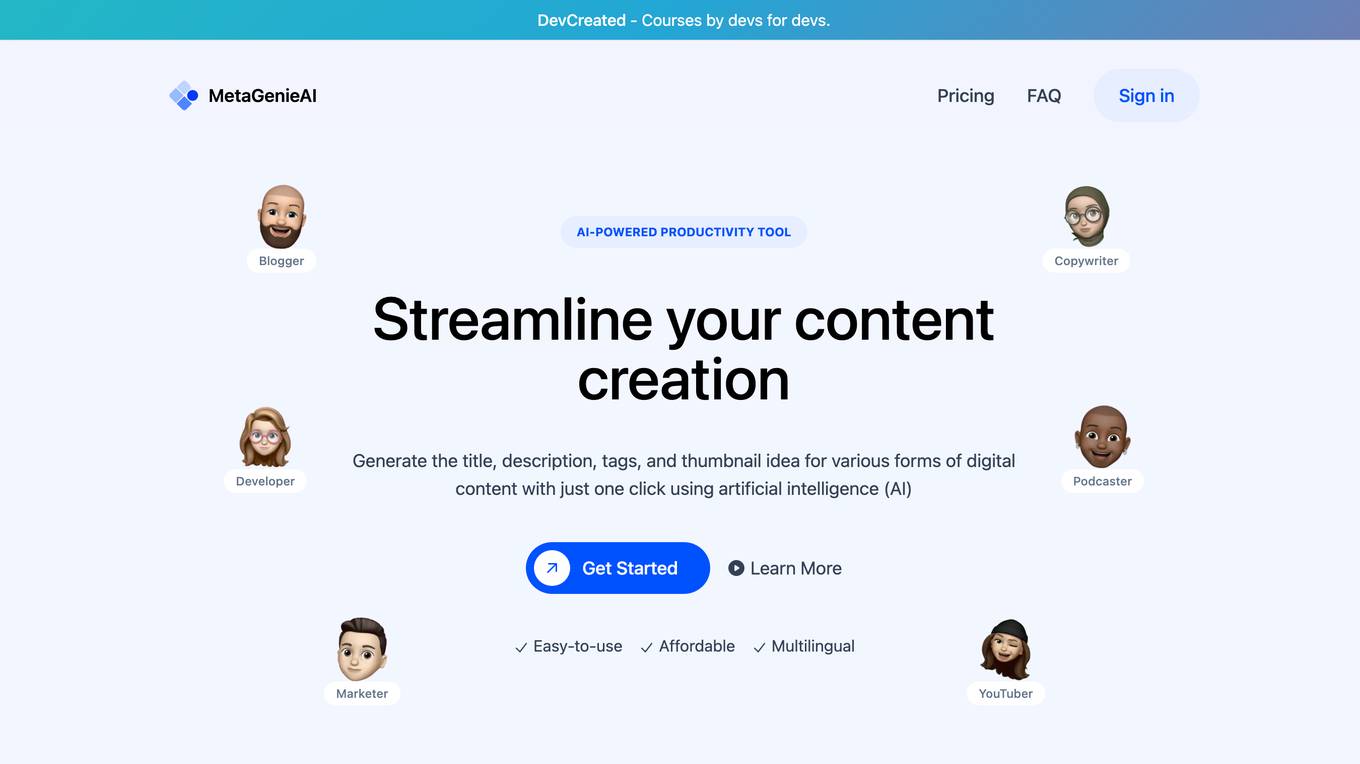
MetaGenieAI
MetaGenieAI is an AI-powered productivity tool that helps you generate high-quality metadata for all forms of digital content, including social media posts, blog articles, e-commerce product descriptions, and more. With MetaGenieAI, you can quickly and easily create compelling titles, descriptions, tags, and thumbnail ideas that will help your content stand out from the crowd and reach a wider audience.
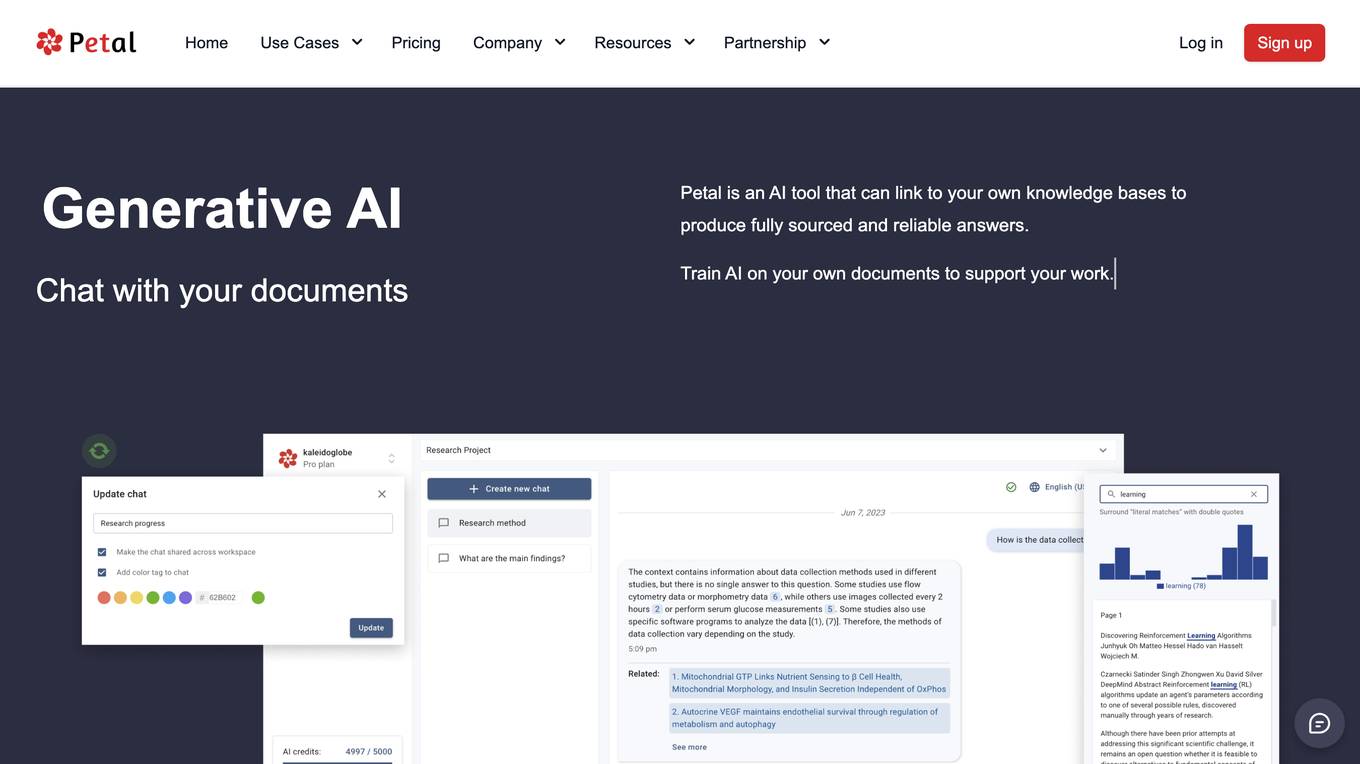
Petal
Petal is a document analysis platform powered by generative AI technology. It allows users to chat with their documents, providing fully sourced and reliable answers by linking to their own knowledge bases. Users can train AI on their documents to support their work, ensuring centralized knowledge management and document synchronization. Petal offers features such as automatic metadata extraction, file deduplication, and collaboration tools to enhance productivity and streamline workflows for researchers, faculty, and industry experts.

PhotoTag.ai
PhotoTag.ai is an AI-powered platform that helps users generate tags, titles, and descriptions for photos and videos, saving valuable time. With the ability to upload various image and video file types, users can easily export files with added metadata or integrate with stock platforms. The platform offers features like cutting-edge AI for precise image labels, customizable upload settings, and the ability to process multiple files simultaneously. PhotoTag.ai is ideal for stock photography, e-commerce, marketing, and more, providing affordable pricing options and seamless workflow integration.
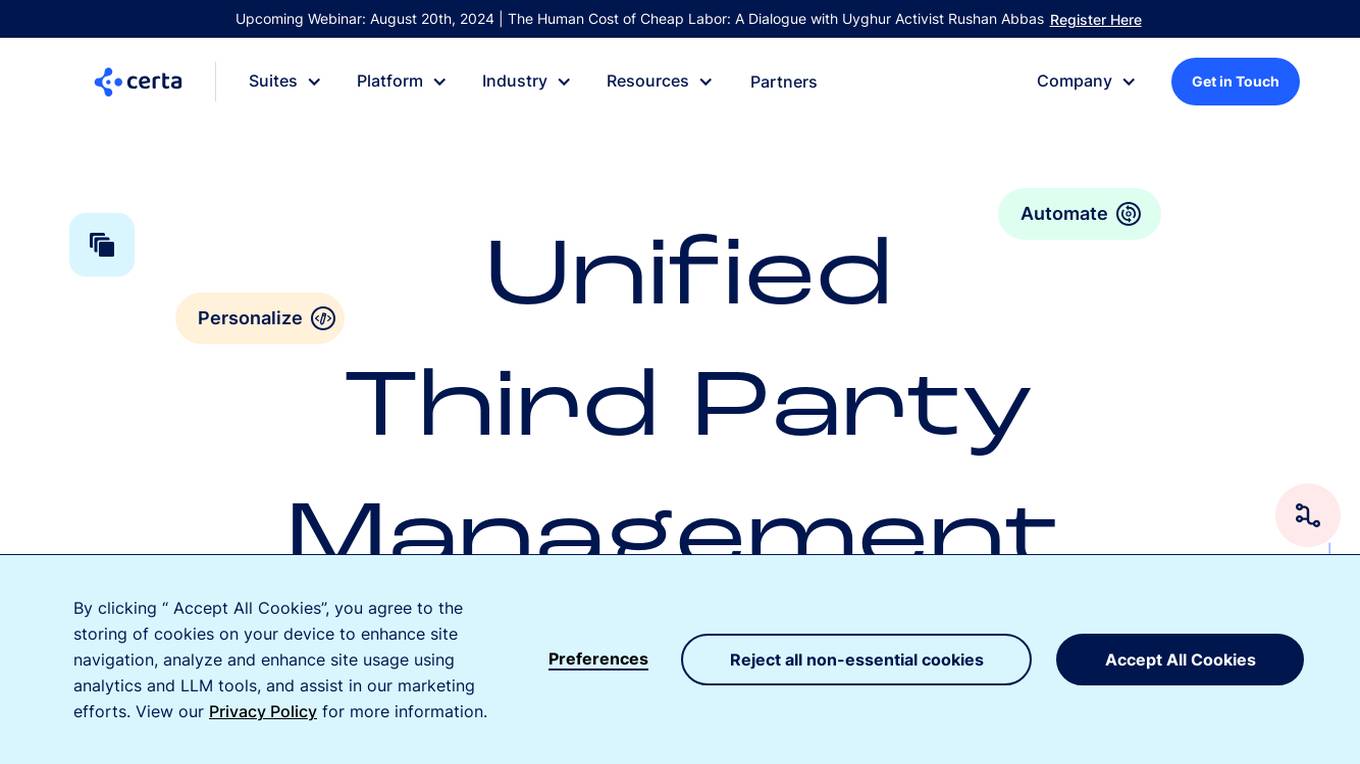
Certa
Certa is an all-in-one toolkit for third-party lifecycle management, powered by AI. It streamlines processes by connecting data sources, reducing IT resource needs, and providing full visibility over every stage. Certa offers personalized workflows, tailored automation, modular building blocks, integration with various apps, and smart services like NLP and metadata extraction. It helps automate compliance rules, streamline procurement, and track ESG performance. With 100+ integrations, Certa aims to save time and money for businesses while ensuring audit transparency and security.
4 - Open Source AI Tools
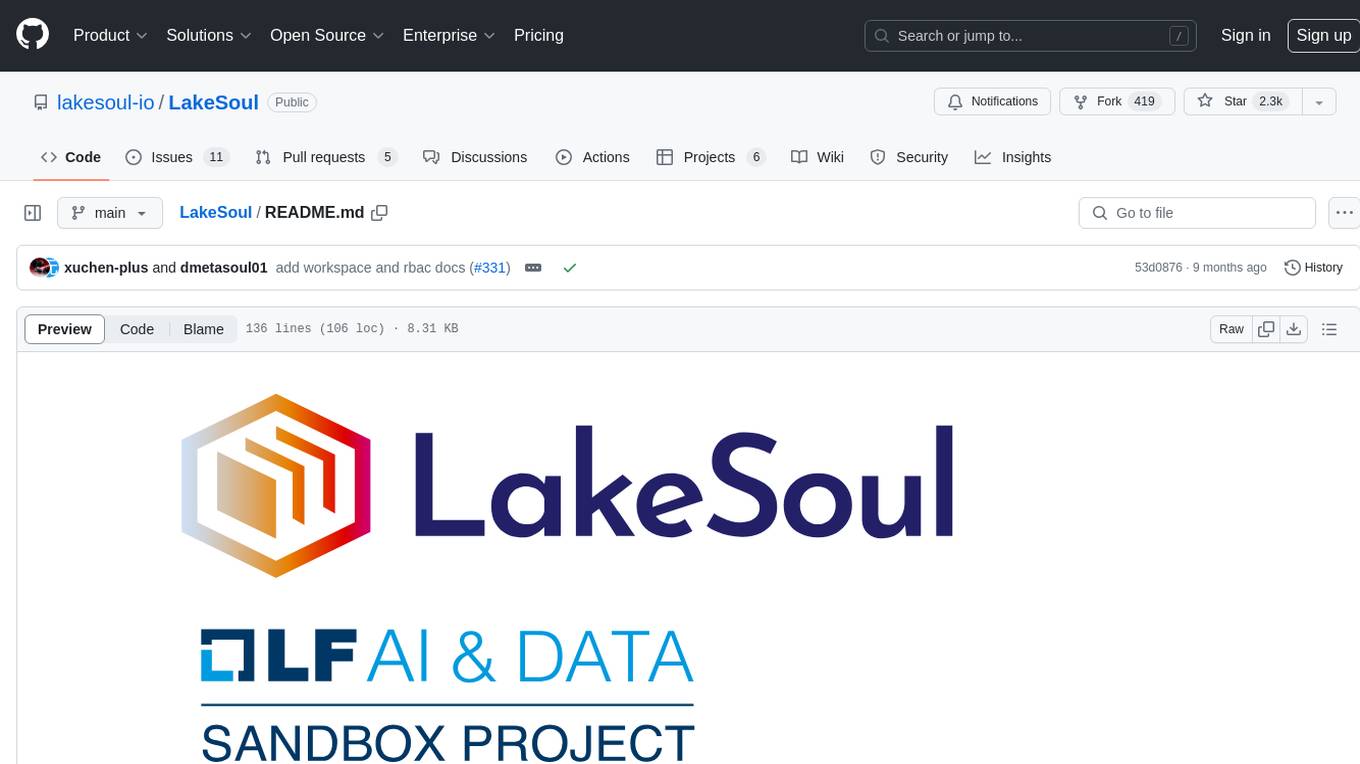
LakeSoul
LakeSoul is a cloud-native Lakehouse framework that supports scalable metadata management, ACID transactions, efficient and flexible upsert operation, schema evolution, and unified streaming & batch processing. It supports multiple computing engines like Spark, Flink, Presto, and PyTorch, and computing modes such as batch, stream, MPP, and AI. LakeSoul scales metadata management and achieves ACID control by using PostgreSQL. It provides features like automatic compaction, table lifecycle maintenance, redundant data cleaning, and permission isolation for metadata.
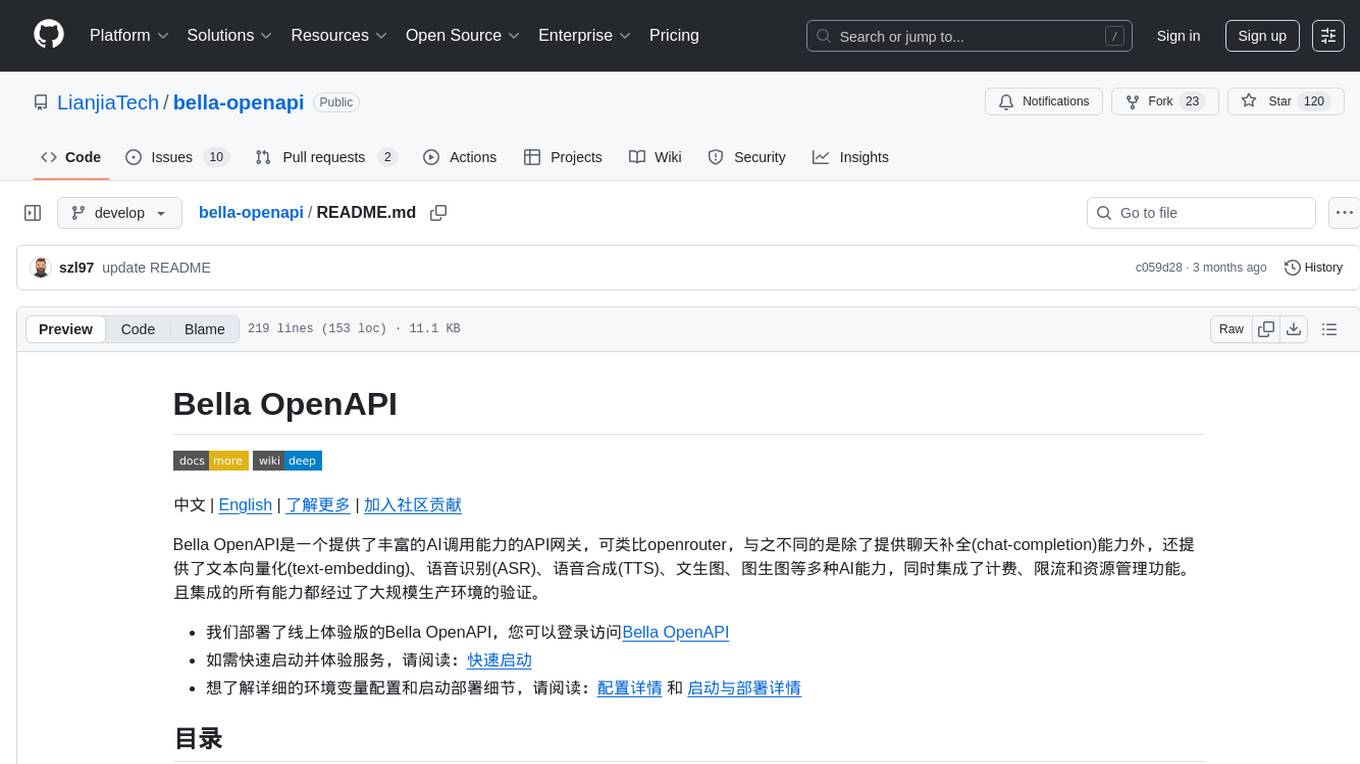
bella-openapi
Bella OpenAPI is an API gateway that provides rich AI capabilities, similar to openrouter. In addition to chat completion ability, it also offers text embedding, ASR, TTS, image-to-image, and text-to-image AI capabilities. It integrates billing, rate limiting, and resource management functions. All integrated capabilities have been validated in large-scale production environments. The tool supports various AI capabilities, metadata management, unified login service, billing and rate limiting, and has been validated in large-scale production environments for stability and reliability. It offers a user-friendly experience with Java-friendly technology stack, convenient cloud-based experience service, and Dockerized deployment.
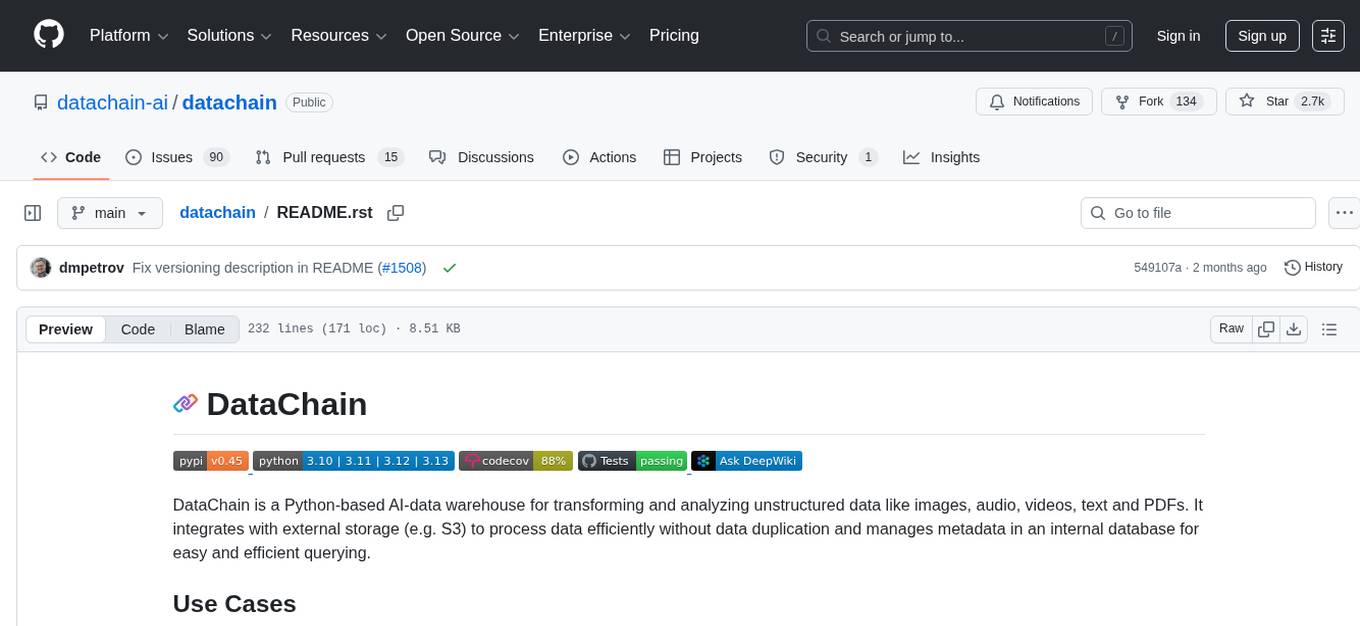
datachain
DataChain is a Python-based AI-data warehouse for transforming and analyzing unstructured data like images, audio, videos, text, and PDFs. It integrates with external storage to process data efficiently without duplication and manages metadata for easy querying. Use cases include ETL, analytics, versioning, and incremental processing. Key features include multimodal dataset versioning, Python-friendly operations, data enrichment, and processing. The tool allows for generating metadata using AI models, filtering, joining, and grouping datasets, and performing high-performance vectorized operations.
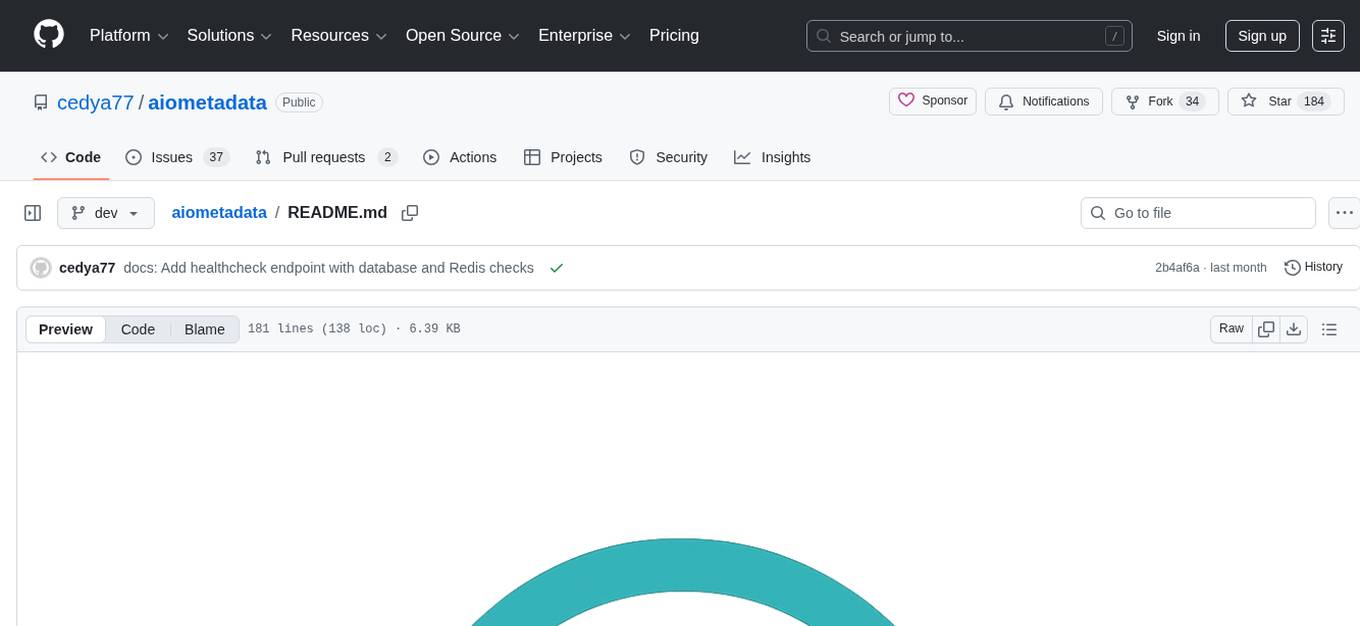
aiometadata
AIOMetadata is a next-generation metadata addon for Stremio that aggregates and enriches movie, series, and anime metadata from multiple sources like TMDB, TVDB, MyAnimeList, AniList, IMDb, and more. It offers rich artwork, custom catalogs, streaming provider integration, dynamic search, user configuration, global caching, advanced ID mapping, and a modern UI. Users can host it or self-host using Docker Compose, configure catalogs, providers, search engines, integrations, and security settings via a UI, and access various API endpoints for managing user config, cache, posters, images, and more. Supported providers include TMDB, TVDB, IMDb, MyAnimeList, AniList, Kitsu, Fanart.tv, MDBList, and more. Development involves backend and frontend setup using Redis for caching and SQLite/PostgreSQL for config storage. The project is licensed under Apache 2.0.
20 - OpenAI Gpts

Stock Footage Metadata
Expert in video titles and keywords, with strict adherence to best practices.

FODMAPs Dietician
Dietician that helps those with IBS manage their symptoms via FODMAPs. FODMAP stands for fermentable oligosaccharides, disaccharides, monosaccharides and polyols. These are the chemical names of 5 naturally occurring sugars that are not well absorbed by your small intestine.
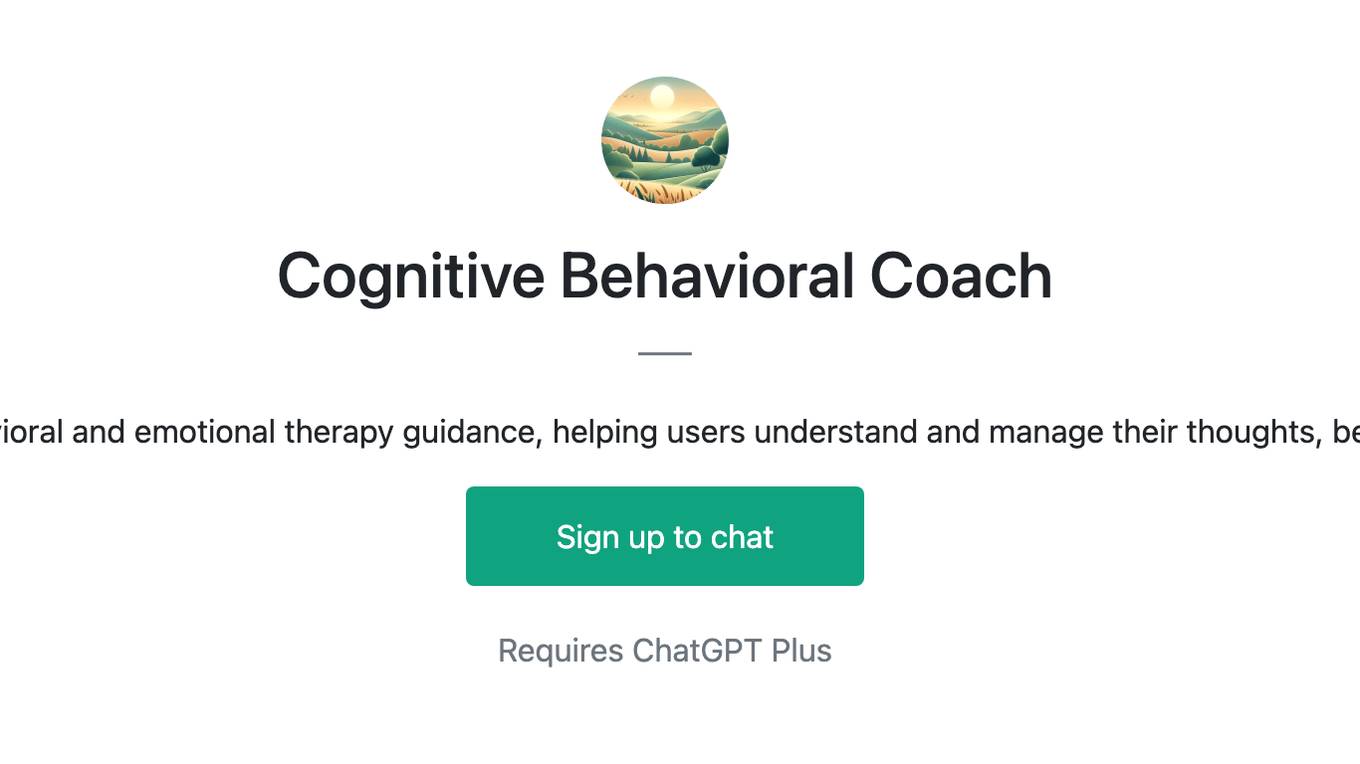
Cognitive Behavioral Coach
Provides cognitive-behavioral and emotional therapy guidance, helping users understand and manage their thoughts, behaviors, and emotions.

1ACulma - Management Coach
Cross-cultural management. Useful for those who relocate to another country or manage cross-cultural teams.

Finance Butler(ファイナンス・バトラー)
I manage finances securely with encryption and user authentication.
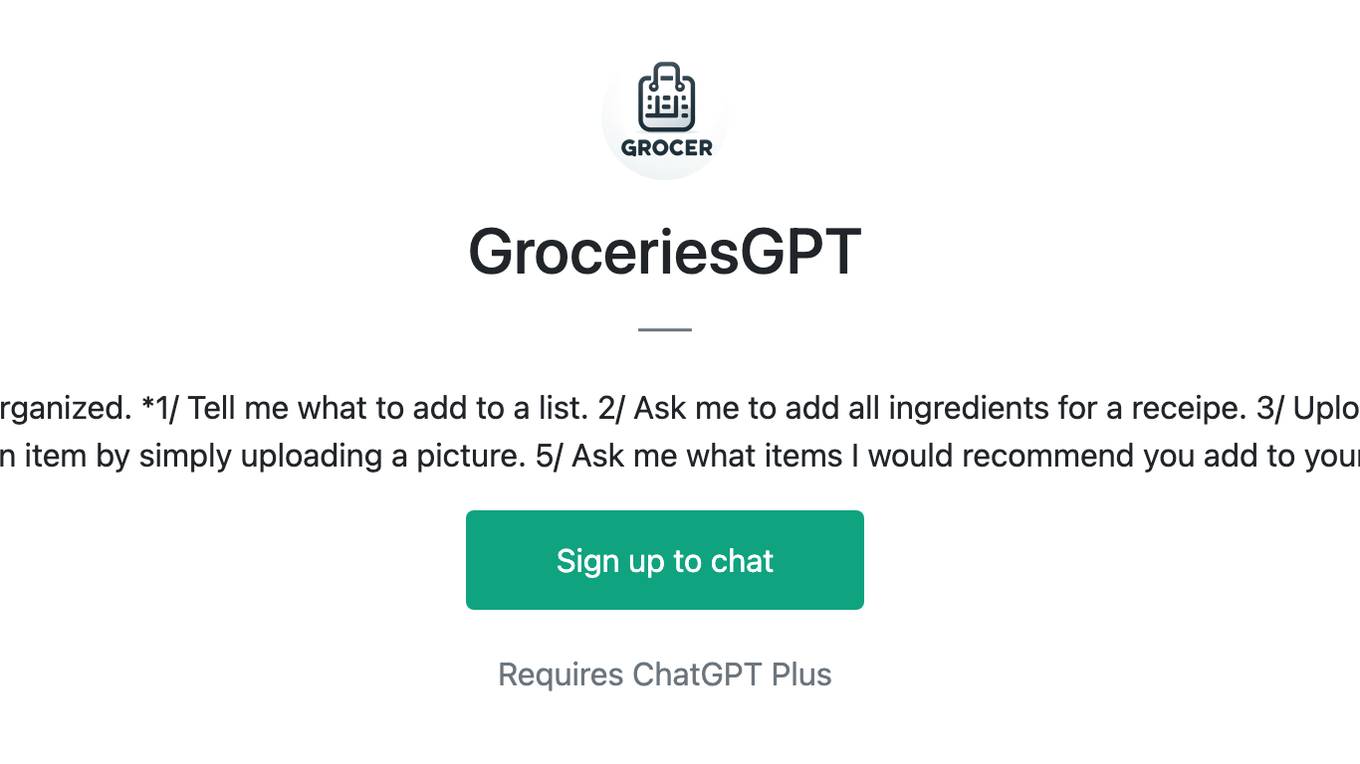
GroceriesGPT
I manage your grocery lists to help you stay organized. *1/ Tell me what to add to a list. 2/ Ask me to add all ingredients for a receipe. 3/ Upload a receipt to remove items from your lists 4/ Add an item by simply uploading a picture. 5/ Ask me what items I would recommend you add to your lists.*
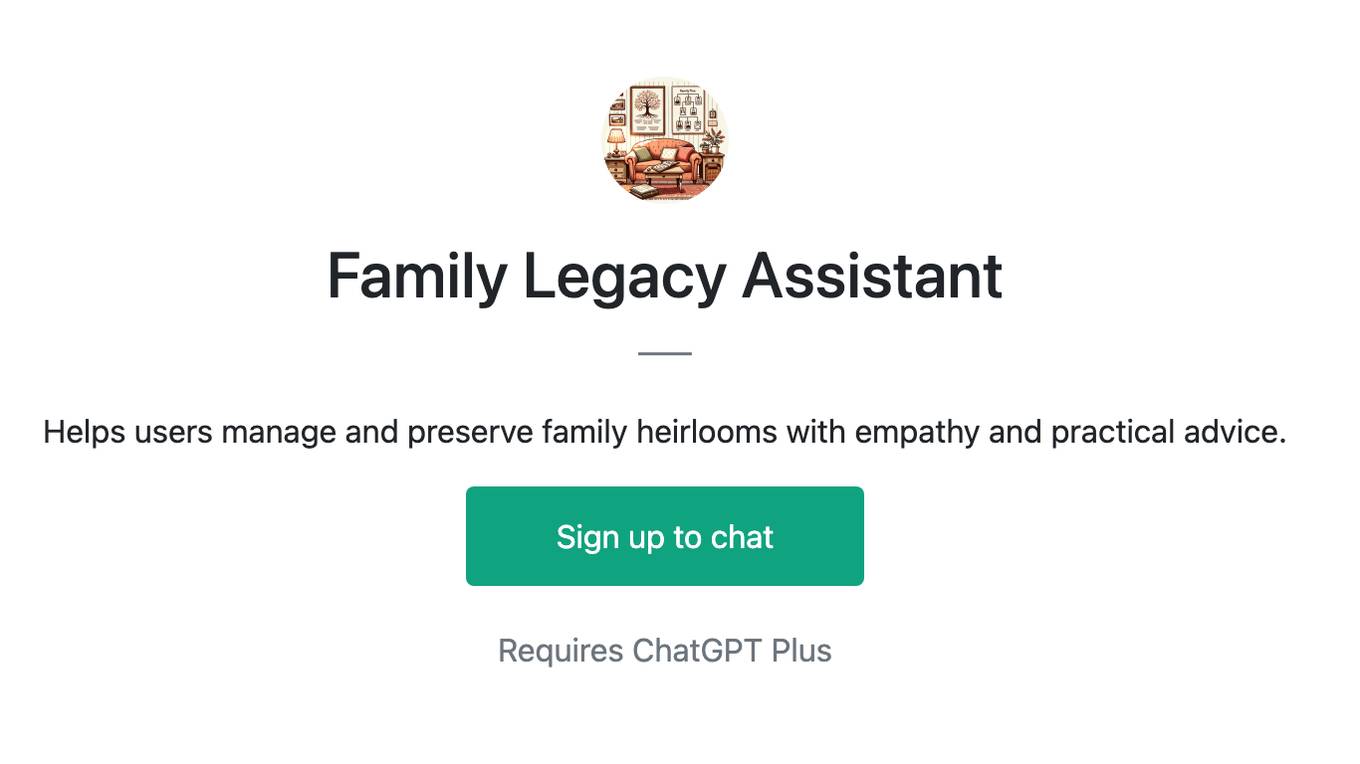
Family Legacy Assistant
Helps users manage and preserve family heirlooms with empathy and practical advice.

AI Home Doctor (Guided Care)
Give me your syptoms and I will provide instructions for how to manage your illness.
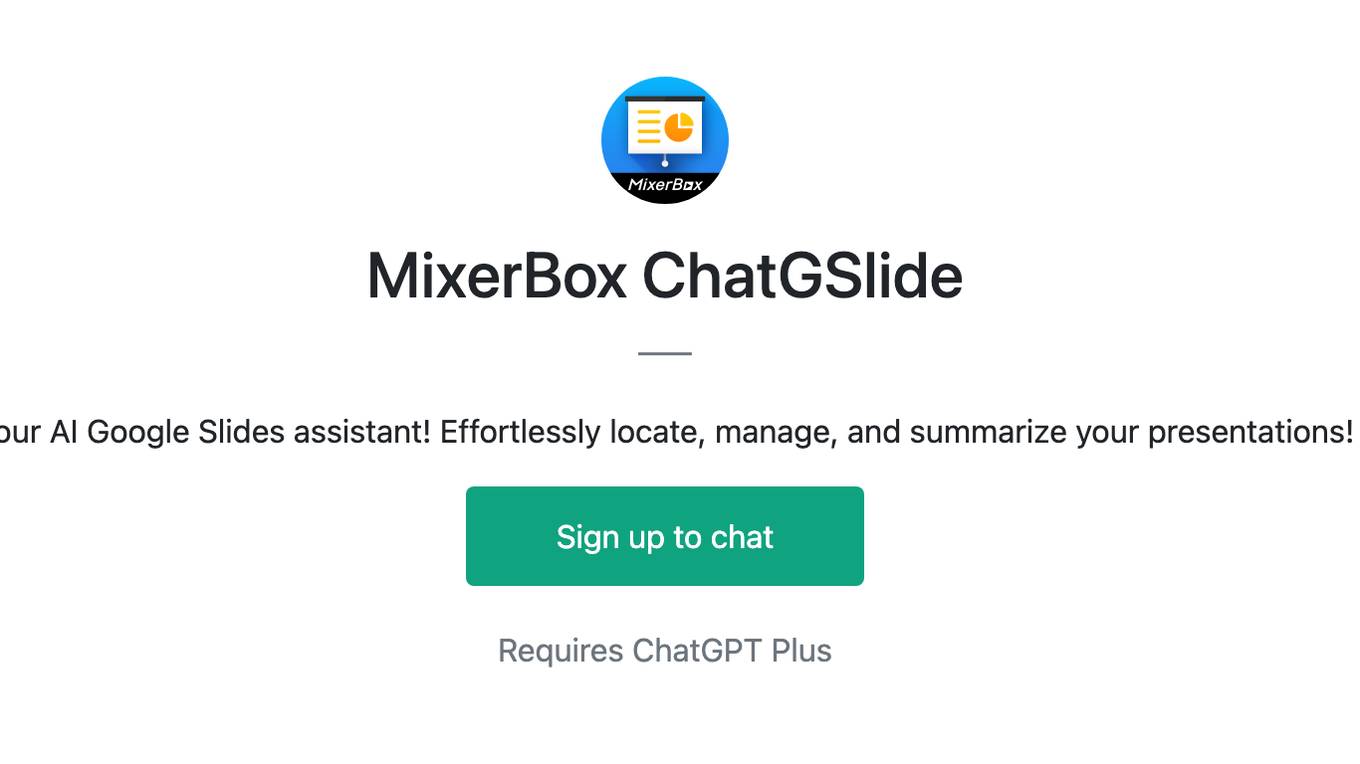
MixerBox ChatGSlide
Your AI Google Slides assistant! Effortlessly locate, manage, and summarize your presentations!

Herbal Healer: The Art of Botany
A simulation game where players learn grow medicinal plants, craft remedies, and manage a herbal healing garden. Another AI Tiny Game by Dave Lalande
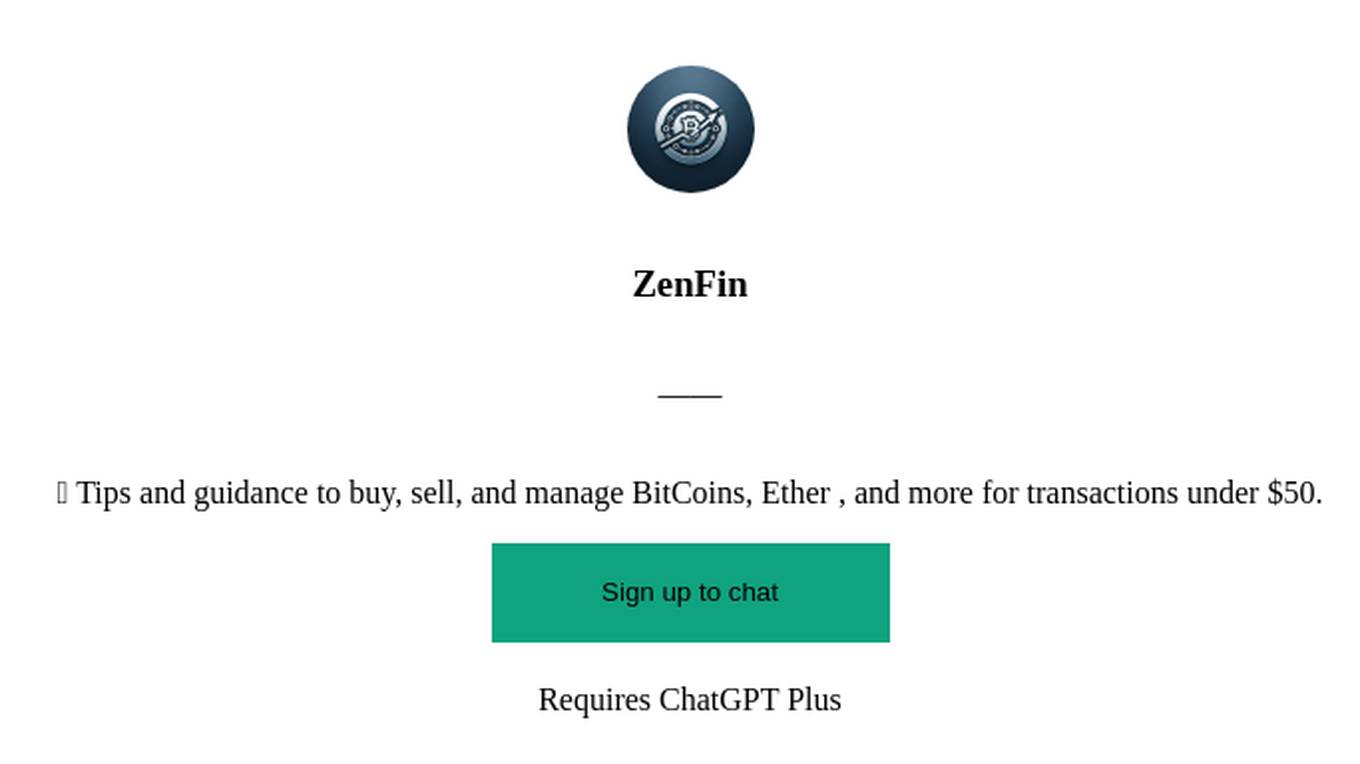
ZenFin
💡 Tips and guidance to buy, sell, and manage BitCoins, Ether , and more for transactions under $50.

DivineFeed
As the Divine Apple II, I defy Moore's Law in this darkly humorous game where you, as God, manage global prayers, navigate celestial politics, and accept that omnipotence can't please everyone.

Couples Financial Planner
Aids couples in managing joint finances, budgeting for future goals, and navigating financial challenges together.
